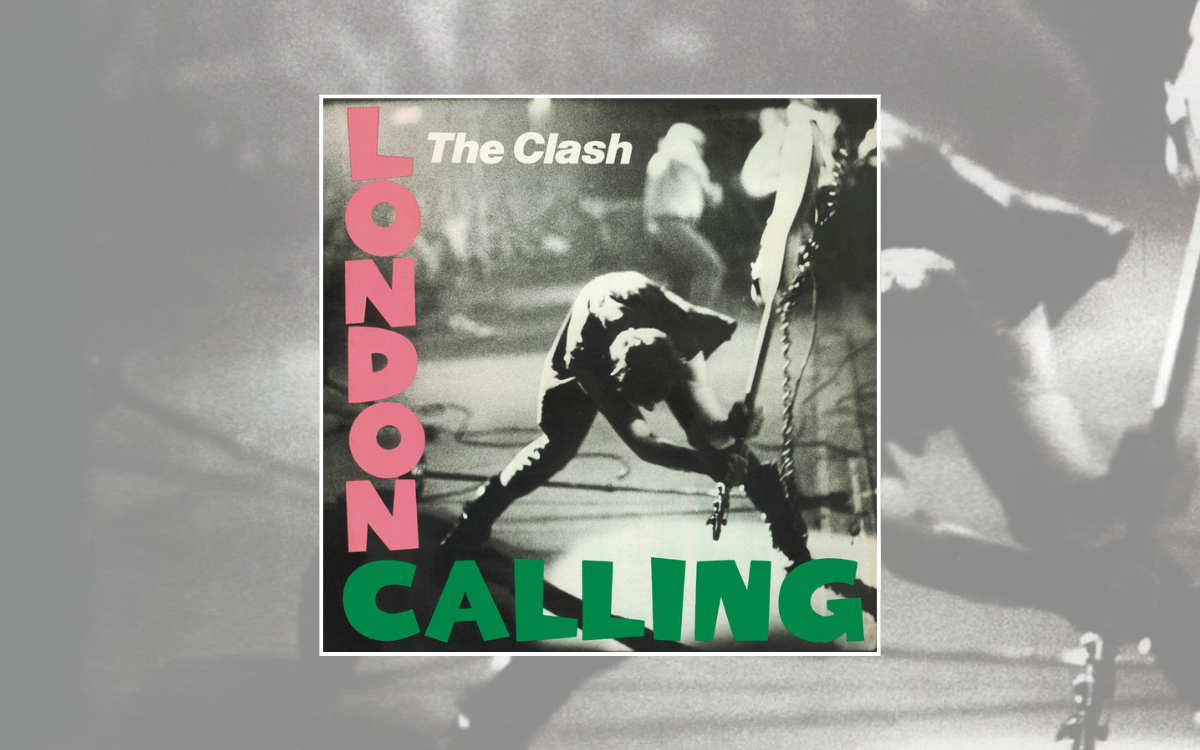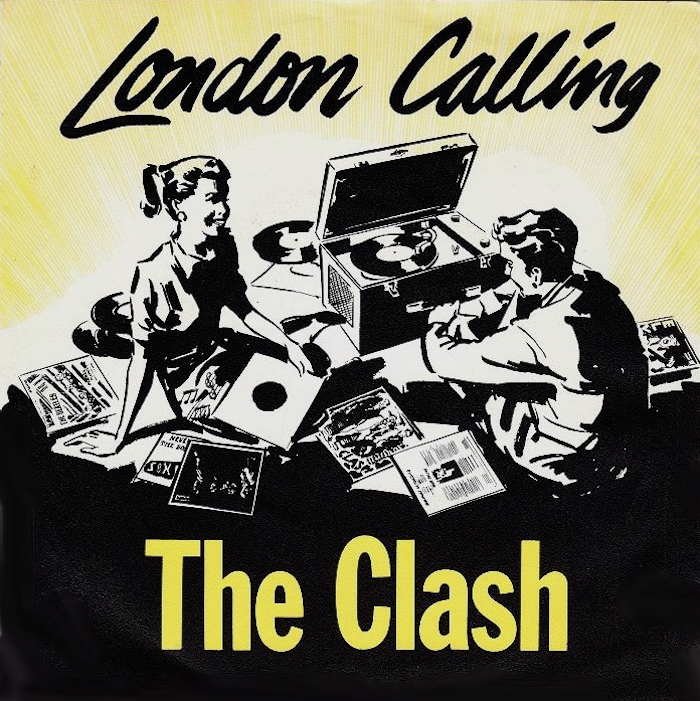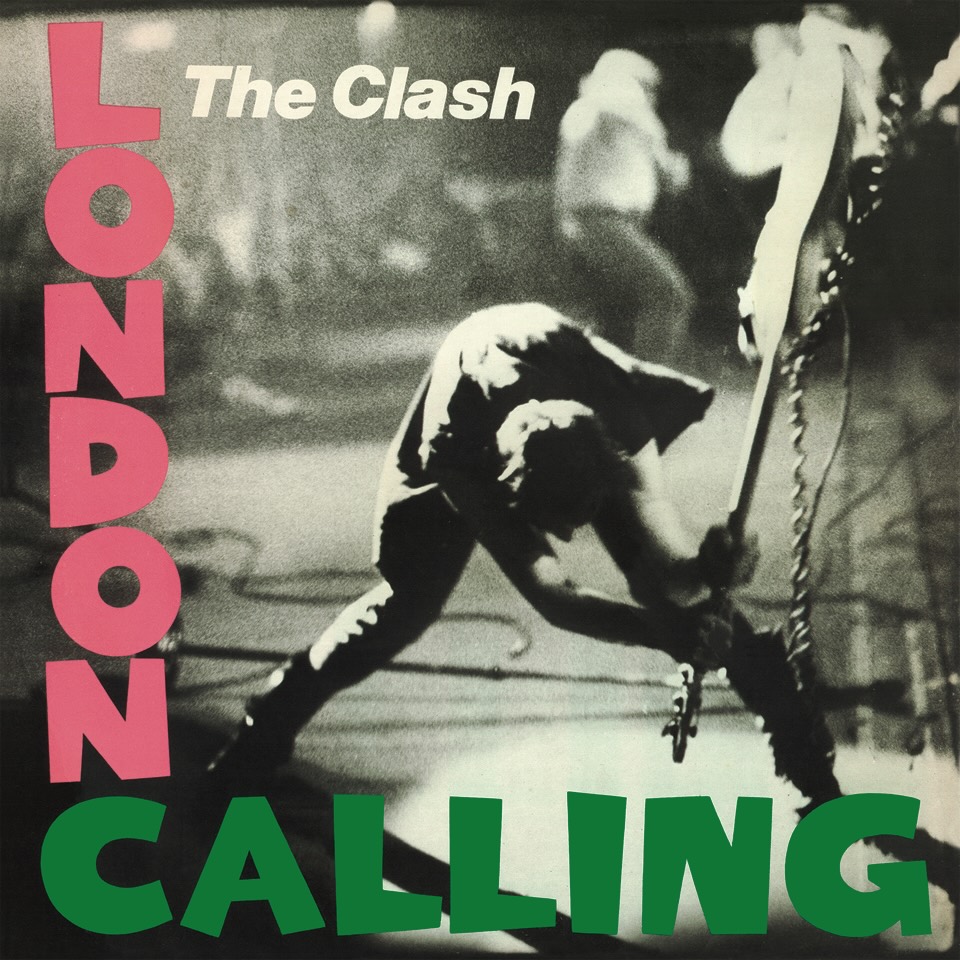The Last Gang In Town’s genre-defying third LP is a timeless rallying cry - bold, brave and brilliant

Although The Clash may not have been quite drinking in the Last Chance Saloon during the spring of 1979, The Last Gang In Town’s backs were against the wall. Entering the studio managerless and broke, the band came out all guns blazing with London Calling an album that sent a wake-up call to all the ‘faraway towns’.
By January 1979, the glorious ball of raging energy that was punk had burnt out. The Sex Pistols had been reduced to a shambolic mess live on stage in San Francisco a year earlier, and while John Lydon had regrouped with the more experimental Public Image Ltd, his sardonic “ever get the feeling you’ve been cheated?” Pistols sign-off seemed a fitting epitaph for a movement that had promised so much.
The only true torchbearers left standing appeared to be Messrs Joe Strummer, Mick Jones, Paul Simonon and Topper Headon. However, The Clash themselves were, as Strummer readily admitted in Don Letts’ excellent documentary The Clash: Westway To The World, at their lowest ebb. “I think,” he said, “that is when we showed our greatest mettle.”

All The Young Punks
Rewind three years and The Clash, alongside the Pistols and The Damned, were heralded as punk pioneers by the rock press when the scene exploded in 1976. Their eponymous debut album, released in the UK on 8 April 1977, had smashed its way to the Top 15 and featured anthemic favourites such as I’m So Bored With The USA, White Riot, London’s Burning and Career Opportunities, alongside a cover of Police & Thieves. The inclusion of the Junior Murvin reggae number set The Clash apart from their contemporaries and, no doubt already feeling constrained by the phlegm-soaked straight jacket of punk, Strummer knew their rallying cry had to be heard: “It needed to break out and be kinda global.”
With eyes on the US, CBS suggested Sandy Pearlman produce the second album. While Give ’Em Enough Rope contains some of the band’s best-loved tracks – Safe European Home, English Civil War, Tommy Gun, Guns On The Roof and Stay Free – the LP received criticism from some quarters for its glossy finish. For many, Pearlman had stripped all the volatile vim and barbed nervous energy of The Clash. However, it did claim the No. 2 spot in the UK album chart and helped cement a foothold in the States. Esteemed US rock critic Lester Bangs wrote in The Village Voice dated 11 December 1978, that …Rope was “more evidence that The Clash are the greatest rock & roll band left standing.”
While the first two albums were well received, the band were in financial dire straits. “Economically, we were really tight,” Strummer told Melody Maker’s Chris Bohn in December 1979. The Clash’s relationship with their manager Bernie Rhodes had disintegrated and he was fired. As a result, they lost their Camden HQ at Rehearsal Rehearsals and Simonon’s then girlfriend, Caroline Coon, stepped into the Rhodes-shaped hole. A Stateside tour was bankrolled by their US label Epic, and on returning to London the search was on for a new rehearsal space and the little matter of album number three.
Back In The Garage
Johnny Green, The Clash’s road manager and all-round fixer, discovered Vanilla Rehearsal Studios in Pimlico. From the outside, Vanilla looked inconspicuous to any passers-by, a windowless garage that housed a rehearsal space towards the back. Offering seclusion and privacy, Vanilla was the perfect place for the band to escape friends, family and, most importantly, prying ears. In his book A Riot Of Our Own: Night & Day With The Clash, Green wrote: “One day, I caught Annie Lennox, then of The Tourists, halfway up the stairs, bending an ear towards the music, and I chucked her out.”
Between May and August, The Clash worked tirelessly at Vanilla. Strummer would write most of the lyrics and Jones the music. Strummer told interviewer Mal Peachey: “It just seemed to be like one huge body of work all done in one go… A real intensity of effort, and our only recreation was playing five-a-side football.”
Football, funnily enough, proved to be an important catalyst in the band’s daily routine. The Clash factored in time every day for a game and whenever members of the record company dropped by to see how things were progressing a match was arranged. “The teams were normally us against them,” laughed Jones… “It was quite rough.”
At Vanilla, each member of the band drew inspiration from the sounds that had shaped them: Strummer explored his deep-rooted love for all things rock ’n’ roll and Simonon tinkered with reggae rhythms, while Headon played around with jazz licks. “Punk was getting narrower and narrower, painting itself into a corner,” explained Jones. “We thought we could just do any kind of music.”
As productivity levels intensified, the band briefly entertained the idea of producing the album themselves, capturing the immediacy of the moment and not replicating the mistakes levelled at Give ’Em Enough Rope. However, CBS were looking for a name and there was only one on The Clash’s lips.
Everybody Say, ‘Is He All Right?’
Guy Stevens’ reputation had been established for his work with early-70s rock outfits such as Free and Mott The Hoople, and he’d been in the frame to work with The Clash in 1976. Having tracked the maverick producer to a pub in Soho, Strummer returned to Vanilla with instructions to get down on tape what they had been working on. The “Vanilla Tape Incident” would go down as another legendary tale in Clash folklore.
Green, charged with the responsibility of delivering the cassette of the band’s latest creations, explained in his book: “That night, we were delighted and had a few beers. On the way home I had a kip on the Victoria Line and ended up in Seven Sisters. It wasn’t till I reached home that I realised I had left the tape on the Tube. Unfortunately for bootleggers, The Baker [Clash roadie Garry Baker] had labelled the tape ‘Val Doonican’. There was nothing for it but to own up. All I got for my confession was ‘wanker’ and the band made Guy another tape. He loved it.”
Vanilla Thriller
A copy of The Vanilla Tapes was discovered by Jones some years later in a forgotten cardboard box and appeared on the 25th anniversary release of London Calling alongside the Don Letts film The Last Testament: The Making of London Calling. The documentary’s grainy footage of Stevens working with The Clash at Wessex Studios provides a valuable insight. No matter how excited The Clash were about their new songs, nothing could compete with Stevens’ fervour and his unorthodox approach certainly coaxed the very best out of the band. “His world was on fire and he wanted to fan the flames,” said Green.
“He’d pick up a ladder and swing that around and then he’d throw six or eight chairs against the back wall,” recalled Jones. Talking to Melody Maker in December 1979, Strummer said: “He comes in and grabs me by the throat and says, ‘I deal with emotions’, and that’s it. He doesn’t deal with knobs or whatever else producers deal with. He’s very off the wall, and he understands the spontaneity of the moment.”
Operating as a calming yin to Stevens’ chaotic yang was sound engineer Bill Price. “Guy used to believe that his job as record producer was to install the maximum emotion in the record,” Price reveals in The Last Testament. “He used to inject his personality into the musicians, face-to-face, as they were playing.”
Given the groundwork put in at Pimlico, The Clash were able to record the album during a five- to six-week period. At Wessex, they were playing purely to impress Stevens. “He was a one-man audience, as rowdy as a thousand young punks,” wrote Green. “The Clash knew he was only interested in greatness.” It proved a greatness unsurpassed.
The Right Profile
Befitting a classic album, the London Calling cover is equally iconic. The combination of photographer Pennie Smith’s dramatic image of Paul Simonon destroying his bass on stage at New York’s Palladium and the striking pink and green Ray Lowry lettering, a direct homage to Elvis Presley’s self-titled debut, remains a fervent salute to the legacy of rock ’n’ roll. Significantly perhaps, while an exuberant Elvis is signalling the birth of rock’n’roll by holding his guitar aloft, here is The Clash (who had planned to call the album The Last Testament), defiantly smashing one down…
Remembering the gig in Westway To The World, Simonon said: “There was quite a lot of tension. We’re doing the show and we were nearing the end. Nothing was complete and I didn’t feel satisfied. Out of frustration, I just pulled the bass up and bashed it around.”
Picking up the story, Smith recalled: “I watched him, and his guitar went up instead of down, he didn’t do a jump. I started backing off, hence it being out of focus, and just kept shooting.”
This Is London Calling…
Always wanting to give fans value for money, The Clash insisted that when London Calling was released the double album would retail for the price of a single LP. Unsurprisingly, CBS refused but agreed to include a free 12″. This free disc played at 33rpm and was made up of nine tracks. The Clash had got what they wanted, and the record was released on 14 December 1979 in the UK.
Talking to Trouser Press’ Chris Salewicz, Jones said: “It’s our 20 ‘Greatest Hits’. We knew it was coming out at Christmas time, so we thought we would go up well against all the other 20 Greatest Hits. We think it stands up quite well against Lena Martell.” It was a point well made.
While journalist Charles Shaar Murray may have famously described The Clash as the “kind of garage band who should speedily be returned to their garage, preferably with the motor running” in 1976, he was towing the NME line three years later. In his review of 15 December 1979, Murray wrote: “London Calling is the first of The Clash’s albums that is truly equal in stature to their legend. Parts of it sound totally unlike anything they have ever recorded before, yet it is the most quintessentially Clash-like Clash record thus far.”
Hitting the US in January 1980, Rolling Stone magazine’s Tom Carson claimed London Calling was “so rich and far-reaching that it leaves you not just exhilarated but exalted and triumphantly alive.”
Unfortunately, Garry Bushell writing in Sounds (15 December 1979), didn’t get the memo… or simply didn’t get it. He awarded the album a meagre two stars and complained: “There’s no hunger here, no vision or coherence or charisma, no killer punches, no sense of fighting to be heard, nothing that makes you go ‘wow’.”
The record-buying public disagreed with Bushell and the album entered the UK chart at No.9. Murray concluded in his review: “London Calling: damn right. Now everybody from Birmingham, England to Birmingham, Alabama, call ’em back. This is the one”. It was time for The Clash to go global, and London Calling’s influence would ultimately span generations.
“The Best Album Of The 1980s”
How do you follow a double album everyone heralds as a masterpiece? Well, if you are The Clash, you go back into the studio and record a triple. The sprawling, and somewhat divisive Sandinista! (1980), strayed further afield, absorbing gospel, folk, dub, calypso, disco and hip hop.
After challenging the listener, the band delivered the more palatable, single LP Combat Rock (1982). The group’s biggest commercial success, it contained some of The Clash’s most popular songs, such as Know Your Rights, Straight To Hell, Rock The Casbah and Should I Stay Or Should I Go. It would also spell the end of The Clash we knew and loved. Headon’s spiralling drug addiction pushed his bandmates to fire him, while Jones’ now fractious relationship with Strummer had reached breaking point and the guitarist left to form Big Audio Dynamite with Don Letts. Strummer and Simonon’s “Clash MkII” recorded and toured the disappointing Cut The Crap (1985), but by then The Clash’s race was run.
A reissue of Should I Stay Or Should I Go gave The Clash their only UK No. 1 in 1991 but, despite reconciling their differences, the group never reformed. On 15 November 2002, Strummer and his band The Mescaleros played a benefit show for striking fire fighters at London’s Acton Town Hall. Jones, who was in the audience, joined the band on stage for riotous versions of Bankrobber, White Riot and London’s Burning. However, Strummer’s passing on 22 December 2002 ended any possibility of a full reunion.
In 1989, Rolling Stone ranked London Calling as the best album of the 1980s and 10 years later, Q magazine named it the fourth greatest British album of all time. “Many say that is our finest hour,” said Strummer in Westway To The World. While Simonon added: “The best point of The Clash was probably London Calling. That was the most consistent period.”
Ultimately, London Calling is the sound of The Clash being themselves. Jones said: “I dunno where the sound came from, but I think it is the reflection of your personality and the culmination of all your experiences to date. You can hear all my life coming out in microcosm and then it’s a bigger thing. It is you.”
The Last Testament
Ten famous friends tell us why London Calling changed everything:
JAKE BURNS (STIFF LITTLE FINGERS)
“I loved the brashness of punk when it first appeared, but I was disappointed in the apparent nihilism. The Clash gave it a social conscience. Inflammable Material owes a lot to the first Clash album. Most bands follow the blueprint of “second album, much like the first”, then branch out a little on the third. But they went the whole hog. The title track is a monumental piece of music. From the crashing chords and Joe’s wolf howl, you could tell it was a song you’d be listening to for the rest of your life.”
TIM WHEELER (ASH)
“The Clash had it all. Great songs, great style and they delivered a great message. I was 18 when I first met Joe Strummer. We were mixing 1977 in the same studio he was using. My English teacher had lent me a copy of that first Clash album and here I was talking with Joe… not only that, he asked me for my autograph because his daughter was an Ash fan! London Calling is so crazy-diverse, only The Clash could pull it off.”
FRANK TURNER
“The Clash are one of the two original leaders of punk rock. While the Pistols brought more rage and attitude, The Clash introduced politics, wit and intelligence. London Calling feels like the record where they found their stride. As a young kid growing up in rural England and bored to death, London really did call to me. The title track captures that perfectly for me.”
KIRK BRANDON (SPEAR OF DESTINY/THEATRE OF HATE)
“Seeing The Clash was a watershed in my life. Goodbye stadium lightshows and guitar I could never play, hello reality and angry faces. It was political music in a time of politicised youth. Mick produced Theatre Of Hate’s Westworld album and he was such an innovator. London Calling is pretty diverse, they take a few steps to the left with Lost In The Supermarket and Jimmy Jazz, but Guns Of Brixton, London Calling and Spanish Bombs bite pretty deep.”
BILLY DUFFY (THE CULT/THEATRE OF HATE)
“The second album really resonated with my rock sensibilities, but London Calling is such a pivotal album. It broke the mould and allowed bands to be experimental. They looked great and it was a curated image, but not in any way pretentious. The Clash took Theatre Of Hate under their wing when we supported them and I parachuted into that rock’n’roll world.”
PETER HOOK
“I wasn’t a fan to begin with, I regarded them as a bit too “dressy” for punk. It wasn’t until I got their LPs that I changed my mind. I was completely floored. That first record was brilliant, angry and so energetic, it really had a ‘fuck you’ attitude and I loved them from then on. I liked London Calling a lot, it showed a maturity that mirrored my own experiences.”
RICHARD JOBSON (THE SKIDS)
“The Clash were a huge influence on my life. Their music was the driving force for The Skids when we started out. As a 16-year-old, I travelled all over the UK to see them play live and am very proud to say they all became my friends in different ways. I really miss Joe. The Clash were the first of the original punk bands to move on and become a musical force with a new type of energy in their songs. London Calling is even more relevant today when the right-wing factions have taken over the direction of the whole of the UK.”
BRUCE FOXTON (THE JAM, FROM THE JAM)
“I think Paul Weller was inspired by pretty much everything that was going on around that time, and I’m sure Joe’s lyric-writing would’ve influenced him. London Calling has become more special as the years have gone by. In hindsight, I realise what a great album it is, but at the time we were more interested in what we were doing. London Calling and The Guns Of Brixton still sound fresh today.”
HUEY MORGAN (FUN LOVIN’ CRIMINALS)
“We still talk about The Clash because they wrote about things that remain pertinent. In 1979, Jimmy Carter was screwing everything up and there were a lot of dissatisfied kids tuning into what Joe was saying. That’s why London Calling broke the band Stateside. Mick and Joe had hit their stride as a songwriting partnership. I put the album on, and listen to all of it. You don’t single out one part of the Mona Lisa.”
ANDREW LEVY (BRAND NEW HEAVIES)
“I was a teenager living in Ealing when London Calling was released. It had a raw sound and it was cool to hear London mentioned in a massive hit. I lived in Ladbroke Grove during the late 80s and my girlfriend at the time knew Mick’s wife, so he would pop over. It was just before the Heavies formed and he showed me how to programme a drum machine in my tiny bedroom studio.”

The Songs
London Calling
The album’s opener, which peaked at No. 11 in the UK singles chart on 19 January 1980, fades out with a series of bleeps, created by Mick Jones’ guitar pickups, spelling out SOS in Morse Code.
Brand New Cadillac
Vince Taylor’s rebel-rousing rockabilly number had initially been used by The Clash as a warm-up song before recording.
Jimmy Jazz
“The Clash take over Tom Waits’ favourite bar”, wrote Charles Shaar Murray in NME. “A lazy, alcoholic shuffle with goose-grease saxophone.”
Hateful
It has been suggested this could be one of Joe Strummer’s anti-drug expressions, with the line: “This year I’ve lost some friends” a reference to Sid Vicious, who died after an overdose in February.
Rudie Can’t Fail
The song’s title is derived from Desmond Dekker’s 1967 number 007 (Shanty Town). Letts said: “Rudie… sums up that moment when we were turning each other on to our respective cultures.”
Spanish Bombs
Strummer’s homage to the International Brigades of the Spanish Civil War. He developed the idea for the song after hearing a news report on the ETA terror bombings of Costa Brava tourist hotels.
The Right Profile
A tribute to the Hollywood actor Montgomery Clift, Johnny Green recalled how Guy Stevens had a copy of Patricia Bosworth’s Clift biography and told Joe: “Here’s a story of greatness and tragedy. It uplifts you through your tears.”
Lost In The Supermarket
Often considered a Mick track, but actually written by Joe. Jones said: “I always thought he had me in mind and that he was writing about me.”
Clampdown
Strummer’s intro is hard to decipher: “The kingdom is ransacked/ the jewels all taken back/ and the chopper descends/ they’re hidden in the back/with a message on a half-baked tape/ with the spool going round/ saying I’m back here in this place/ and I could cry/ and there’s smoke you could click on.”
The Guns Of Brixton
Not considering himself a singer, Paul Simonon said: “The mic was right up against this glass panel of the control room and sitting in front of me, two feet behind the glass, was some American CBS bloke and it really annoyed me. That’s probably why the vocals came out the way they did.”
Wrong ’Em Boyo
A cover of The Rulers’ song, the story revolves around the murder of Billy Lyons by ‘Stag’ Lee Shelton. In Passion Is A Fashion: The Story Of The Clash, Pat Gilbert suggests The Clash had “a good deal of brass neck to sing about Stagger Lee, but somehow they pull it off… maybe because their passion for black American culture was so strong.”
Death Or Glory
Nutty producer Guy Stevens’ unorthodox studio antics are well-documented. Simonon said: “We played Death Or Glory and he just lost it. He ran into the room picking chairs up and smashed them against the wall. We were thinking, ‘God, he’s gone mad’.”
Koka Kola
Mirroring the relentless depiction of workplace oppression in Clampdown, Koka Kola is a satirical swipe at big business and consumer culture.
The Card Cheat
With its Phil Spector-ish vibes, the band double-tracked everything to achieve that unmistakable ‘wall of sound’ feel.
Lover’s Rock
A track inspired by The Tao Of Love & Sex, Jolan Chang’s best-selling book on the art of lovemaking, which places the emphasis on male restraint and female pleasure.
Four Horsemen
One of the album’s more muscular moments, Jones celebrates the rock’n’roll piano that “makes this tune”. Mick Gallagher, from The Blockheads, was drafted in to play organ on the album.
I’m Not Down
“Down and down and hit the floor/ down and down and down some more.” A defiant Jones stares depression in the face to create a triumphant and uplifting slice of anthemic rock.
Revolution Rock
A Danny Ray original, the track could be a nod towards the 2-Tone sound that had been developing. An instrumental version features heavily in the 1980 film Rude Boystarring Ray Gange. Ray told Classic Pop: “I became friends with Joe after talking to him in a pub. I was working in a record shop in Soho and the Rude Boy connection came about when I asked a customer what he did. It turned out he was a filmmaker called David Mingay and his company were about to start on a movie about The Clash. I’d moved to California by the time London Calling was released, but I’d heard most of the songs live or at rehearsals. It was such a broad spectrum. The intensity of the title track is incredible, a message that remains so relevant.”
Train In Vain
Originally intended to be given away on a flexi disc with the NME, it appears as an extra track after the deal had fallen through… it’s hidden, because the sleeves had already been printed. The song was inspired by Jones’ on-off relationship with The Slits’ guitarist, Viv Albertine. Read her wonderful autobiography Clothes, Clothes, Clothes. Music, Music, Music. Boys, Boys, Boys.
For more on The Clash click here
Subscribe to Classic Pop magazine here
Classic Pop may earn commission from the links on this page, but we only feature products we think you will enjoy.


